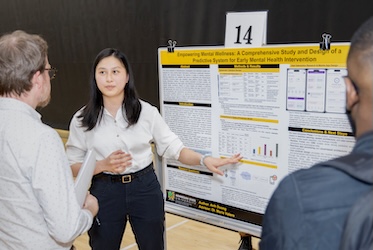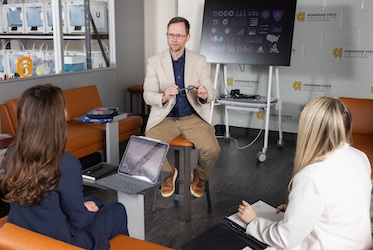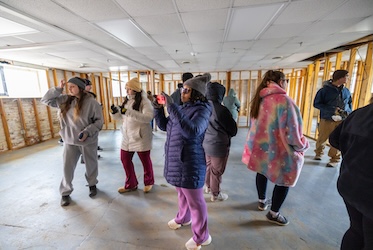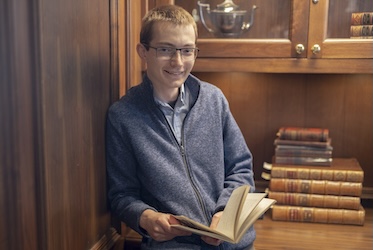
Kennesaw State institute, professor help Cherokee County address homelessness
KENNESAW, Ga. | Sep 11, 2023
Connections matter in matching people who have no home with services they need.
In Cherokee County this year, connections between a United Way leader who is a two-time Kennesaw State University graduate and scholars at KSU led to a study that pinpointed the extent of the needs of unhoused people in the county.
“We’re all connected,” said Matthew Lyons, an assistant professor of integrated health science at Kennesaw State. “Each of us has what it takes to lift up someone else, and collectively we can make sure each human being has what they need to live a fulfilled life.”
Thanks in part to a needs assessment Lyons spearheaded over a period of 18 months, Cherokee County’s Board of Commissioners earlier this year approved $2.5 million in American Rescue Plan (ARP) funds to reduce homelessness in Cherokee County.
The money will be used to build an emergency shelter and support programs that can help people obtain housing, such as rent assistance, job training, and counseling.
The Advocate
The effort began with homelessness advocates. The Homeless Coalition of Cherokee County formed in 2020 from a group of six churches, hiring Marianne Butler to spearhead their efforts as executive director. She quickly found an ally in MUST Ministries, which serves people in need across several counties.
In 2021, representatives from several community organizations contacted Cherokee County commissioners to open a dialogue, and the commissioners pointed to some available ARP funds. But it would take a thorough reporting of the issue to convince the commissioners to use taxpayer dollars to combat it.
“Anecdotally, we all say there’s a need, but when you have that systematic research to also support the anecdotal evidence, it gets easier to convey the need to other community members,” Butler said. “That’s why we’re extremely appreciative of the information in the data and the hard work put into the efforts from KSU.”
The Owl
As director for the northwest region of United Way Atlanta, Nicole Lawson-Doll has been deeply involved with underserved communities. As a proud KSU alumna, she has also kept in touch with her alma mater, serving on the alumni association board of directors and communicating with Jenn Wade-Berg, professor of human services and associate dean for student success in the Wellstar College of Health and Human Services.
At the request of the homeless coalition and MUST, Lawson-Doll reached out to Wade-Berg, who directed her to the Burruss Institute and Christy Storey, the Institute’s Director of Operations, for assistance in documenting the needs of unhoused people in Cherokee County.
“Dr. Wade-Berg has been a great friend and partner on several projects,” said Lawson-Doll, who earned a bachelor’s in human services in 2001 and a Master of Public Administration in 2002. “She connected me to Christy, and when we in Cherokee reviewed their proposal, we determined the Burruss Institute was the best choice for this opportunity.”
The Server
Storey coordinates research-related efforts dedicated to community service at the A.L. Burruss Institute of Public Service and Research. The Institute has produced needs assessments for organizations that serve children, older youth and senior citizens, but this homelessness project was a first. Storey said the project needed the aid of an academic with expertise in homelessness, which led her to Lyons.
“I thought he would be a great subject matter expert,” Storey said. “He jumped right in, and he was very passionate about the project, very interested in working with us.”
The Academic
Lyons was about to begin his postdoctoral work at KSU for about a month when he received the email from Storey, inviting him to participate in assembling the needs assessment proposal. Storey said she knew Lyons had experience working with unhoused communities as an academic, but Lyons’ history in this aspect of service goes back even further.
The son of two social workers, Lyons was exposed to the issue of homelessness early on, and he took that knowledge to his undergraduate years at Georgia State University, where he would sometimes bring food to people living under bridges and in the streets near the downtown Atlanta campus. After earning his bachelor’s degree there, he earned a Master of Theological Studies from Harvard University while approaching the issue of homelessness from an ethical standpoint. He then earned a Master of Social Work at the University of Southern California before returning to Georgia State to earn a doctorate in public health.
Now an assistant professor, Lyons’ research connects social work, public health and mental health as well as biostatistics, which made him an ideal partner for the Burruss Institute. With Burruss, Lyons assembled a report about the homeless population in Cherokee County and presented it to commissioners earlier this year.
“We tried to paint this whole picture with the point being, ‘You need an emergency shelter, and you need to start trying to address these upstream factors as well — stagnating wages, increasing rents, lack of access to mental healthcare and lack of affordable childcare,’” Lyons said.
The Report and Results
Based on four data collection arms with both service providers and unhoused people, the report painted a picture of homelessness in Cherokee County that pointed mostly at a lack of emergency shelter and supportive housing (housing that offered ancillary services such as counseling and childcare), though most respondents reported receiving assistance with food as well.
Lyons and his team offered recommendations centered around emergency shelter as a short-term solution but stressed the importance of cooperation between private and governmental entities, with all efforts culminating “in the development of a comprehensive model of homelessness prevention and reduction across the county,” the report said.
The commissioners accepted the report and have allocated funds to efforts to alleviate homelessness. Most of the money is planned for use in building a temporary shelter and other housing, and the remainder will fund various services dealing with the upstream factors.
Lyons said he hopes the county’s data-driven funding will propel KSU to remain at the forefront of addressing homelessness, using its programs and institutes to gain real-world knowledge of the situation and connect people on both sides of the issue.
“Homelessness is one of the most glaring public issues and key indicators that we have things to work on as a society,” Lyons said. “At Kennesaw State, through the Wellstar College and the Burruss Institute, we will work on them urgently and make sure that our fellow human beings can live with safety and dignity and a reasonable degree of health and well-being.”
– By Dave Shelles
Photos by Matt Yung
Related Stories

Passions spark innovation at Kennesaw State Symposium of Student Scholars

Kennesaw State marketing students apply research skills to the real world by assisting nonprofits

Kennesaw State architecture, engineering students reimagine Asheville's devastated River Arts District

First-year Kennesaw State student, author recognized as versed local historian
A leader in innovative teaching and learning, Kennesaw State University offers undergraduate, graduate, and doctoral degrees to its more than 47,000 students. Kennesaw State is a member of the University System of Georgia with 11 academic colleges. The university’s vibrant campus culture, diverse population, strong global ties, and entrepreneurial spirit draw students from throughout the country and the world. Kennesaw State is a Carnegie-designated doctoral research institution (R2), placing it among an elite group of only 8 percent of U.S. colleges and universities with an R1 or R2 status. For more information, visit kennesaw.edu.















